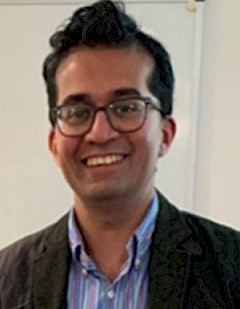Faculty

Siddhartha Kar
Visiting Professor
PhD (University of Cambridge)
https://www.earlycancer.cam.ac.uk/dr-siddhartha-kar
Research Interests: Public Health, Epidemiology, Genetic Epidemiology, Clinical Epidemiology, Non-Communicable Disease Epidemiology, Cancer Epidemiology, Bioinformatics, Data Science, Artificial Intelligence
Profile
Siddhartha Kar (MBBS, PhD, MPH) is a research group leader at the Early Cancer Institute, University of Cambridge and a UK Research and Innovation Future Leaders Fellow. He is also the Director of Postgraduate Education for the Department of Oncology at Cambridge and an honorary senior research fellow at the Medical Research Council Integrative Epidemiology Unit, University of Bristol.
Siddhartha studied medicine at the Byramjee Jeejeebhoy Government Medical College and Sassoon General Hospitals in Pune, India and maintains full registration as a doctor with the Delhi Medical Council. He holds a Master of Public Health (MPH) degree in Epidemiology from the University of Texas at Houston in the US and a PhD in Public Health and Primary Care from the University of Cambridge in the UK, where he was a Gates Cambridge Scholar.
Siddhartha’s scientific training has included research stints at the MD Anderson Cancer Center in Houston, Texas (2010-2012) and as a Junior Research Fellow of Homerton College, Cambridge (2015-2019). He was awarded a Future Leaders Fellowship (FLF) by UK Research and Innovation (UKRI - the UK government's flagship research funding agency) in 2020 that enabled him to establish his independent group within the Medical Research Council (MRC) Integrative Epidemiology Unit at Bristol. He returned to Cambridge as group leader in 2023. As of 2024, Siddhartha has co-authored over 75 peer-reviewed original articles on the genetic epidemiology of cancer, including several contributions in key authorship roles in top-tier global academic journals (citations > 6,500; h-index of 39). He serves as peer reviewer for multiple major journals, UK- and EU-based research funding agencies, advises large-scale cohort studies, and is on the editorial board for ecancer. In addition to the UKRI FLF, he has been awarded grants as principal investigator by the US National Institutes of Health (R01) and as co-investigator by Cancer Research UK, Blood Cancer UK, and the Leukemia & Lymphoma Society (USA). Siddhartha retains a keen interest in healthcare policy and the biomedical innovation ecosystem in India and has written about this in The Lancet and in Nature.
Research
Siddhartha Kar is a cancer epidemiologist and the research group that he leads at the University of Cambridge primarily studies inherited or germline genetic variation, leveraging this variation to investigate the causes, consequences, and correlates of key somatic or tumour genomic aberrations responsible for driving cancer development and progression. The ultimate aim is to use insights from this work to inform the prevention, early detection and treatment of common cancer types.
Siddhartha’s research group is also involved in the search for inherited genetic risk factors that are pleiotropic or shared across some of the major hormone-related cancer types – specifically breast, prostate, ovarian, and endometrial cancers – and also shared between cancers and their risk factors. Cross-cancer pleiotropic genome-wide association studies may offer unique opportunities to build multi-cancer risk prediction and stratification tools to better target screening and early detection interventions.
Beyond genetic epidemiology, Siddhartha is interested in contributing to public health in India with a focus on (i) the growth of cohort studies of non-communicable diseases, (ii) the analysis and interpretation of nationally representative surveys of health and healthcare, and (iii) evidence-based medicine.
Publications
View Dr Kar’s publications here
Teachings
Dr Kar currently lectures at the University of Cambridge on the following programmes: MPhil in Population Health Sciences, MSt in Genomic Medicine, MRes in Cancer Biology, and the Cambridge Cancer Centre-wide lecture series in Cancer Biology and Medicine.
